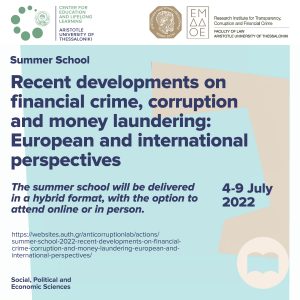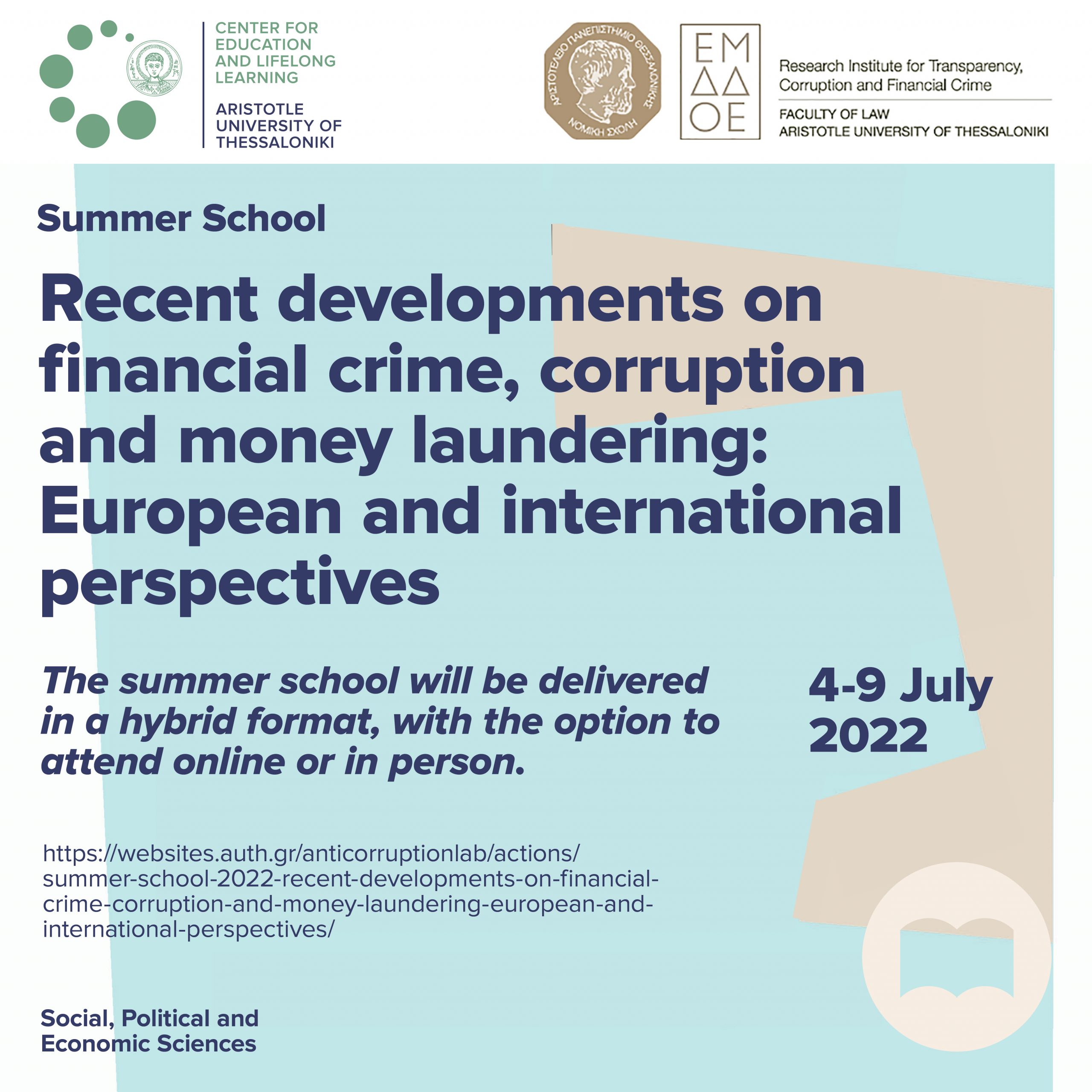Summer school “Recent developments on financial crime, corruption and money laundering: European and international perspectives”
The Research Institute for Transparency, Corruption and Financial Crime, Faculty of Law -Aristotle University of Thessaloniki (https://websites.auth.gr/anticorruptionlab/), through the Center for Education and Lifelong Learning of the Aristotle University of Thessaloniki, hosted an intensive 6-day summer school on recent developments in the fields of financial crime, corruption and money laundering at a national, European and international level, for participants who wish to advance their knowledge in the area.
 The 6-day intensive courses focused on ongoing developments of key issues in combating international fraud, corruption and money laundering, international and European anti-fraud mechanisms and procedures, etc.
The 6-day intensive courses focused on ongoing developments of key issues in combating international fraud, corruption and money laundering, international and European anti-fraud mechanisms and procedures, etc.
Recent developments included, inter alia, the directive on fraud against the EU financial interests, the Regulation on the European Public Prosecutor’s Office, the Criminal Law Anti-Money Laundering Directive, offshore companies, cybermoney, corruption, asset recovery and confiscation, the developments towards an E-Evidence Regulation, tax crime etc.
The summer school’s sessions opened on Monday 4 July 2022. The participants were welcomed by the Institute’s Director, Prof. M. Kaiafa-Gbandi, as well as the Dean of the Faculty of Law – Aristotle University of Thessaloniki. Distinguished Professors from different European Universities and post-doctoral researchers from the Faculty of Law of the Aristotle University of Thessaloniki taught at the summer school’s courses until 9 July 2022.
More specifically, lectures were given by the following Professors (in the order of their appearance in the programme):
- Prof. Maria Kaiafa-Gbandi, Aristotle University Thessaloniki, Greece
- Prof. Helmut Satzger, Ludwig Maximilian University of Munich, Germany
- Prof. Frank Meyer, University of Zurich, Switzerland
- Prof. Thomas Elholm, University of Copenhagen, Denmark
- Assist. Prof. Katerina Savvaidou, Aristotle University Thessaloniki, Greece
- Ass. Prof. Theodoros Papakyriakou, Aristotle University Thessaloniki, Greece
- Dr. jur. Athina Giannakoula, Aristotle University Thessaloniki, Greece
- Dr. jur. Nikos Chatzinikolaou, Aristotle University Thessaloniki, Greece
- Prof. Eric Hilgendorf, University of Würzburg, Germany
- Assist. Prof. Vagia Polyzoidou, Univ. of Nicosia
- Assist. Prof. Konstantinos Chatzikostas, Aristotle University Thessaloniki, Greece
- Prof. Anastasios Valtoudis, Aristotle University Thessaloniki, Greece
- Assist. Prof. Yiannis Naziris, Aristotle University Thessaloniki, Greece
- Prof. Valsamis Mitsilegas, Queen Mary University of London, UK
- Assist. Prof. Athina Sachoulidou, NOVA School of Law, Lisbon
- Prof. Ioannis Igglezakis, Aristotle University Thessaloniki, Greece
- Prof. Pedro Caeiro, University of Coimbra, Portugal
- Dr. Peter Csonka, EU Commission, Head of Unit Criminal Law
The summer school was delivered in a hybrid format, with the option to attend in person or online, taught with the help of a simultaneous teleconferencing system, so that the participants had the chance to interact and participate in the discussion.
Eighty four participants (students, researchers, lawyers, and other professionals) from whom forty-two from all over the world [Switzerland (9), Germany (5), Belgium (3), Italy (3), China (3), Cyprus (3), France (2), Portugal (2), Turkey (2), Australia (1), Denmark (1), India (1), Latvia (1), Lithuania (1), Malaysia (1), Netherlands (1), Romania (1), Russia (1), Slovakia (1), Slovenia (1)] attended the summer school’s courses (46 in person and 38 online), which were taught in English.
Extended materials of the lectures were electronically distributed to the participants before the beginning of the sessions and at the end of every daily course. Intriguing discussions between the participants and the speakers took place throughout the classes, signifying the summer school’s well-aimed subject and high-level works. During the final day of the summer school, Saturday 9 July 2022 a written examination took place. Upon completion of the online seminar, participants who took part at the written examination, were awarded a Certificate of participation with ECTS credits. To those who didn’t participate at the examination a certificate of attendance was awarded.
Συννημένα αρχεία:
